Napoleon the Antichrist & the Christian Revival in Russia of 1812 (Part 1)
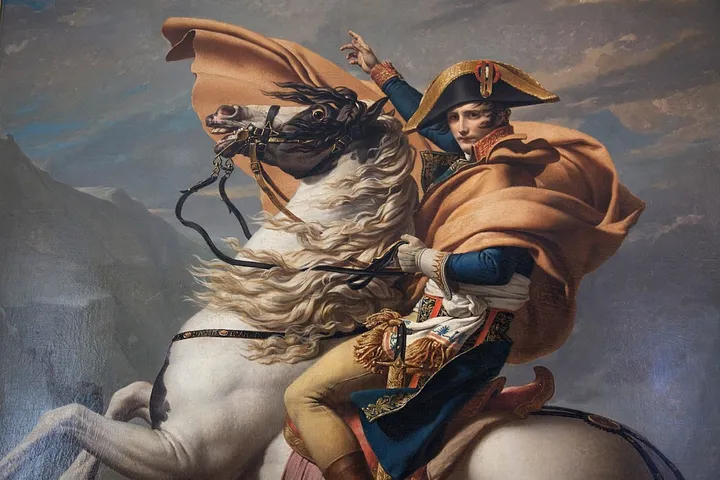
Napoleon Crossing the Alps
The war between Russia and France in 1812 was far more than a military conflict. At the core of this invasion by the French was a deep spiritual battle in which the Christian nation of Russia was under siege by the godless French led by the Emperor Napoleon Bonaparte. Because of many signs, there was widespread belief among the people in Russia that Napoleon was the antichrist, and a deep conviction that they were living in the last days. These events brought about a revival that swept throughout Russia, as the country sought help from God in the face of this existential threat.
As French troops were marching into the heart of Russia, one of the main characters in Leo Tolstoy’s epoch War and Peace, Natasha Rostov, is seen visiting the holy church in St. Petersburg. During the service, she witnessed a pleading prayer to the Almighty God that the country of Russia might be saved from the invasion of the wicked:
Lord God of hosts, God of our salvation! Look down in mercy and compassion upon thy humble people, and in thy love for mankind hear us, spare us, have mercy upon us. Behold, the enemy who confounds thy land and would lay waste to the whole universe has risen up against us; behold, lawless people have gathered together to destroy thine inheritance, to devastate… thy beloved Russia; to defile thy churches, to overthrow thine alters, to violate our holy places. How long, O Lord, how long shall sinners rejoice? How long shall the transgressor hold sway? O Lord God Hear us who pray to Thee: give strength to our most pious, autocratic, and great sovereign emperor Alexander; remember his righteousness and meekness, reward him according to his goodness, by which he preserves us…with Thine Almighty right hand uphold his kingdom and grant him victory over his enemy, as thou didst to Moses over Amalek, to Gideon over Midian, and to David over Goliath. Preserve his army: place a bow of brass into the hands of those fighting in thy name, and gird them with the power to make war. Take up Thine arms and shield, and arise to help us, so that those who contrive evil against us may be put to shame and disgrace, let them be before the face of thy faithful army like dust before the face of the wind, and let thy mighty angel discomfit them and drive them hence… Lord! Let thy power to save in things great and small not be exhausted: thou art God, let no man prevail against thee
In this supplication we are able to glimpse the widespread religious revival taking place in Russia at the time. The roots of this revival had begun after the Russian military’s defeat alongside Austria at the battle of Austerlitz on November 20, 1805. There was widespread belief following the defeat that war would soon come to the Russian heartland. Although the fears of the Russian people were put on hold with the Treaty of Tilsit, their trepidations were to be realized shortly. By 1812, when Natasha witnessed the moving plea to God for safety, Russia was very much on the brink of disaster.
This revival was not only limited to the church and people of Russia; It also had a large effect upon Tsar Alexander I. On the eve of the invasion into Russia by the French, Alexander made a decree that the people of Russia would call out to God for protection and that all would
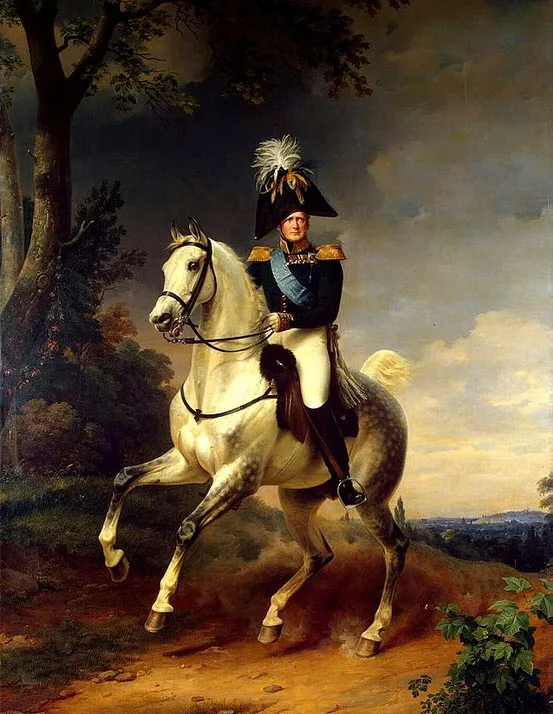
Tsar Alexander I of Russia
Unite…. with the Cross in your heart and weapon in your hand no earthly force can defeat you
This was a recurring theme. The Orthodox Christian Church called the people to “multiply their prayers” for the safety of Russia and that ‘If you are with God, God will be with you’. The Holy Synod also made numerous proclamations throughout all the land, warning the people that Napoleon embodied a “furious enemy of peace and blessed calm”, and that he symbolized a severe threat to the church and religion as a whole.
The widespread belief was that they were witnessing what the book of Revelation calls the last days, and that Napoleon was the antichrist. Although Napoleon was not ultimately the antichrist, he in many ways was a portent of what the antichrist will be like who is depicted in the Bible. As Jesus had warned in Matthew 24:24
For there shall arise false Christs, and false prophets, and shall shew great signs and wonders; insomuch that, if it were possible, they shall deceive the very elect.
As we will see, there remains much evidence meriting the belief of the Russians in 1812 who believed that Napoleon was the antichrist.
Photo by Christian Wiediger on Unsplash
Having risen to power in wake of the French Revolution, many attributed the horrors of the Revolution to Napoleon. In what can almost be described as satanic, the revolution led by the Jacobins, underwent the infamous period in history known as the Reign of Terror. Although Napoleon was not in support of much of the terror enacted during this time, he was a well-known member of the Jacobins. Some even thought of Napoleon as a protégé of the leader of the Jacobins, Maximillian Robespierre. During a 10-month interlude led Robespierre, the revolutionaries took part in the seizing of all church property, the beheading of thousands of ministers, and the replacement of Christianity with a religion deemed the Cult of the Supreme Being. The Revolutionaries were also successful in “chang(ing) times and laws” as Daniel the profit prophesied that the antichrist would attempt to do. (Daniel 7:25) From changing the names of the months, to enacting a 10 day week, their intention was to remove every remnant of the past.
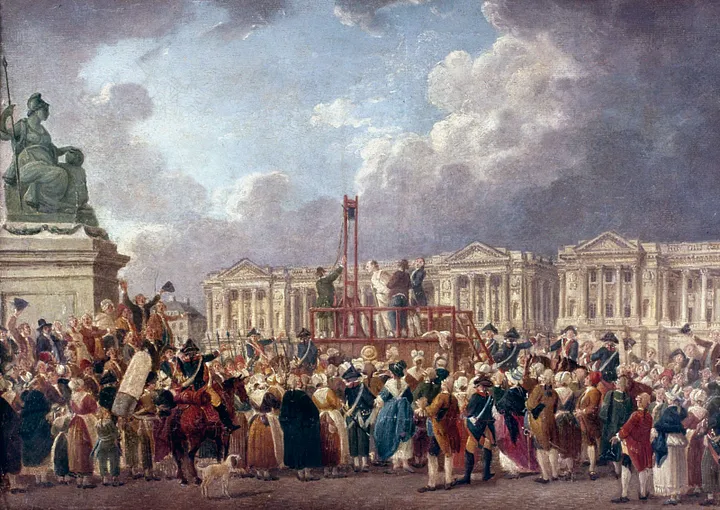
The Guillotine and the Reign of Terror
The Christian church in Russia also looked at Napoleon’s past for instances that might lead credence to their argument. In Napoleon’s birth on the island of Corsica, many Christians in Russia saw a direct fulfillment of Revelation 13:1
And I stood upon the sand of the sea, and saw a beast rise up out of the sea.
Napoleon had also raised alarm throughout the Christian church all over Europe by his broad appeal to the followers of the dominant religions of the world. It has been believed by the church throughout the centuries that the antichrist would be “all things to all people”, and Napoleon’s use of religion for political purposes seemed to eerily resemble that. In his 1798 Egyptian campaign, Napoleon attempted to win over the Muslims throughout the middle east by announcing his faith in the religion of Islam:
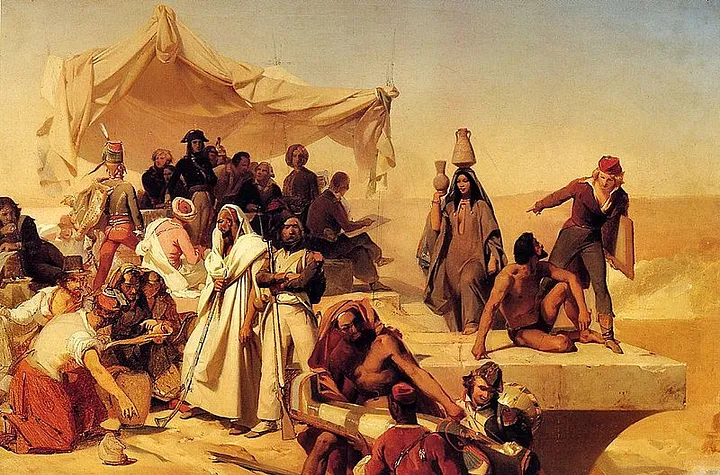
Bonaparte in Egypt
People of Egypt! You will be told by our enemies that I am come to destroy your religion. Believe them not. Tell them that I am come to restore your rights, punish your usurpers, and revive the true worship of Mohammed. Tell them that I venerate, more than do the Mamelukes, God, his prophet, and the Koran.
According to Napoleon’s secretary, this was only a political gesture:
It has been alleged that Bonaparte, when in Egypt, took part in the religious ceremonies and worship of the Muslims… To do so was essential to his success, to the safety of his army, and, consequently, to his glory. In every country he would have drawn up proclamations and delivered addresses on the same principle. In India he would have been for Ali, at Thibet for the Dalai-lama, and in China for Confucius.
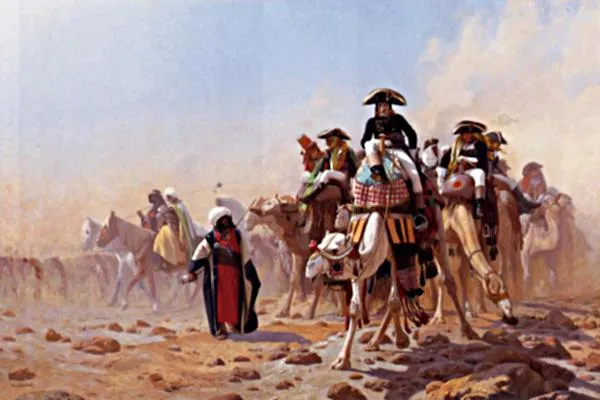
Napoleon in the Middle East
Despite his statements being only political gestures, Napoleon was received with much enthusiasm among the Egyptians who dubbed him Ali Bonaparte. Other Egyptians went as far as calling him the son-in-law of the prophet. Napoleon did later comment that he would have fully embraced Islam if only he would have had more success in the Middle East.
After all, circumstances might have induced me to turn Muslim. It would have been a sign-post; but I should have reached the Euphrates first. A change of religion, inexcusable for the sake of private interests, becomes comprehensible where immense political results are involved. Henri IV. was right in saying, ‘Paris is well worth a mass.’ Do you think the Empire of the East, and perhaps the subjection of the whole of Asia, were not worth a turban and loose trousers?
Napoleon also saw the importance of winning the support of the Catholic church which had enormous influence throughout Europe. For a time, Napoleon expressed admiration to the Christian faith.
He professed the most profound admiration of the doctrines and the moral precepts of the Gospel, and often expressed the wish that he could be a devout believer
With these political gestures, he was able to win the hearts of many people from many different perspectives and religions. In winning the support and praise of such diverse people, Napoleon was truly “all things to all people”. A Muslim to the Muslims, a Jew to the Jews, a Christian to the Christians, and an atheist to the atheists alike, Napoleon was able to accomplish a feat that few world leaders in history have rivaled. All of this added to the consensus in the Russian Orthodox Church that Napoleon was the antichrist.
Here is Part 2